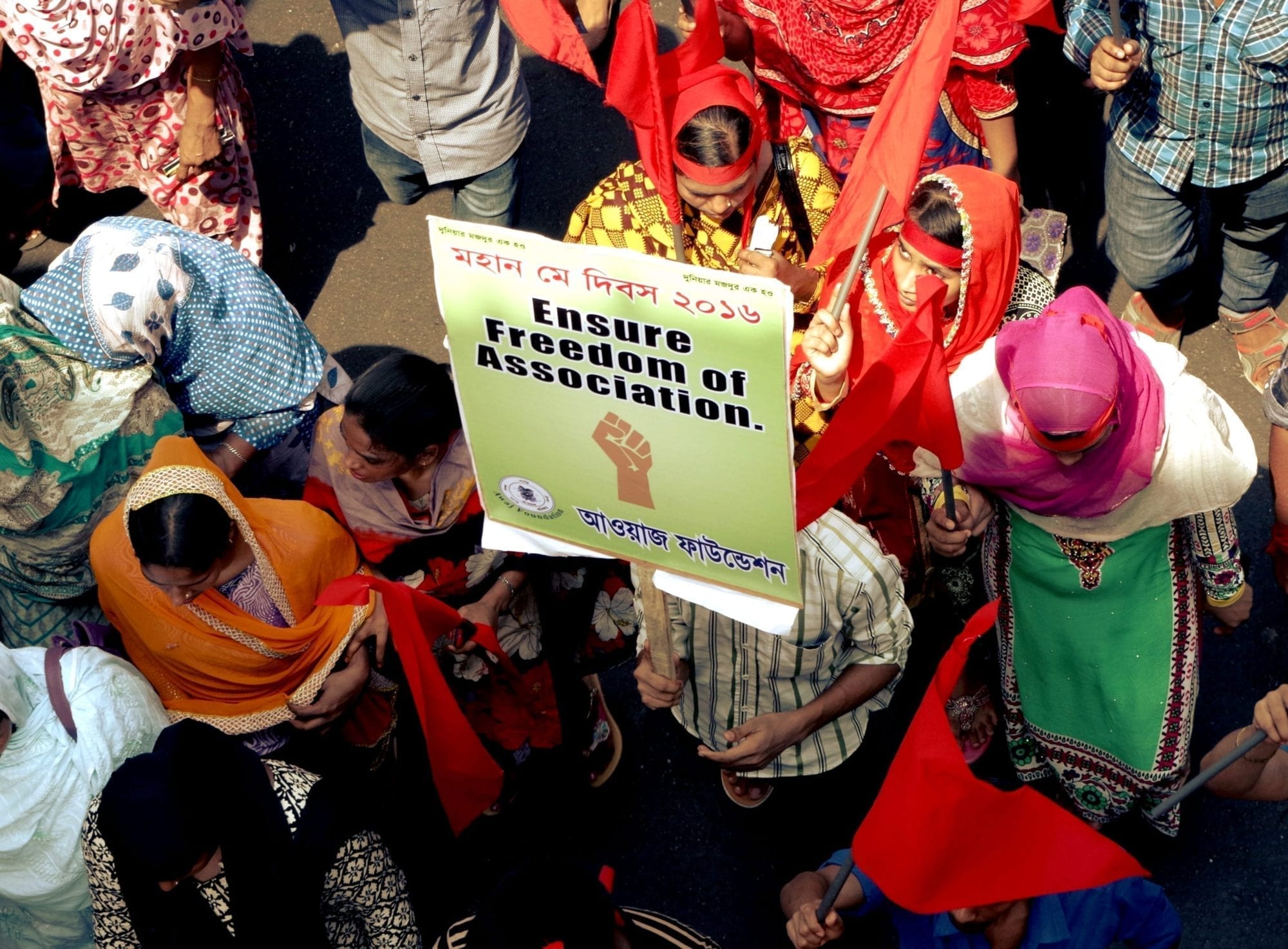
Mar 4, 2019
Even as 11,000 Bangladesh garment workers were fired in the wake of strikes they waged in December and January to protest low wages, many seeking to form unions or take collective action also have been physically threatened, attacked and arrested on trumped-up charges. And union leaders say these employer-directed assaults often take the form of gender-based violence at work.
In testimony provided to the Solidarity Center by garment workers and union leaders, a pattern emerges in which women seeking to form unions or engage in collective action are especially targeted with actions to degrade, demean and intimidate them, and some have suffered physical attacks and rape.
“As we try to form unions, management is hostile against us,” says one garment worker. (Neither workers nor factories will be identified to protect workers against retaliation.) “They threaten me that, what if someone stops me in the road, what can I do as a woman?”
Children Injured in Police Attack on Factory
At one factory where workers walked out on January 7 to demand higher wages, police charged them and threw tear gas into the factory, injuring between 13 and 14 children in the ground floor day care. Managers later “sent out a list of all the mothers with babies and terminated them,” says one worker at the factory. “They did this so that they could close down the day care.”
On the same day, at another garment factory where workers say managers had harassed them ever since they submitted a union registration application in November, police beat workers with rods and sticks and “took away the scarves of women,” threatening to rape them, according to a worker’s eyewitness account.
While Bangladesh employers stepped up attacks directed at women workers during the recent walkouts, they have long used gender-based violence at work as a tactic to intimidate women active in union organizing. In November, hired criminals associated with management and local government officials attacked and raped a woman organizer at a factory in the midst of a campaign to form a union.
Crackdown Amplifies Ongoing Assaults on Worker Rights
The harassment, assaults and arrests of garment workers this year amplifies an increasingly repressive environment for worker organizing that in recent years has included threatening home visits, kidnappings and mass termination.
In one recent example, workers at a garment factory saw their daily production quota increased to 400 pieces a day, up from 250 pieces after they filed with the government for union registration. Workers there say supervisors locked union committee members in bathrooms and hired local criminals to pursue them in the streets.
Even as employers exploit workers’ wage protests as a pretext for infringing on the rights of workers to organize and bargain collectively, government resistance to workers seeking to register unions further represses workers’ efforts to form unions and collectively bargain better wages and working conditions.
Following the deaths of more than 1,200 garment workers in the 2012 fire at the Tazreen Fashions factory and the 2013 Rana Plaza building collapse, workers vigorously organized to form unions and negotiate contracts, as the Bangladesh government and ready-made garment (RMG) employers responded to international pressure to improve safety and wages.
But now Bangladesh, which in 2018 the International Trade Union Confederation (ITUC) ranked as among the world’s 10 worst countries for worker rights, is on the verge of expelling the Accord on Fire and Building Safety in Bangladesh. Established after the Rana Plaza disaster, the legally binding agreement between hundreds of primarily European retail brands and unions conducted safety inspections at more than 1,000 factories and educated workers on safety and other workplace rights.
And without the freedom to form unions and bargain collectively, internationally recognized rights, Bangladesh garment workers are unable to collectively negotiate safer, healthier workplaces.
“We are poor. Just because we formed a union, we have been the victims,” says one worker at a factory where 200 workers were fired after they sought to register a union with the government. The worker says when management learned of their efforts to form a union, women were threatened with rape and men threatened with guns and knives.
“Our photos and fingerprints have been sent to all the factories, so we are not able to find jobs anywhere else. Blacklists are hanging in front of the factories,” she said.
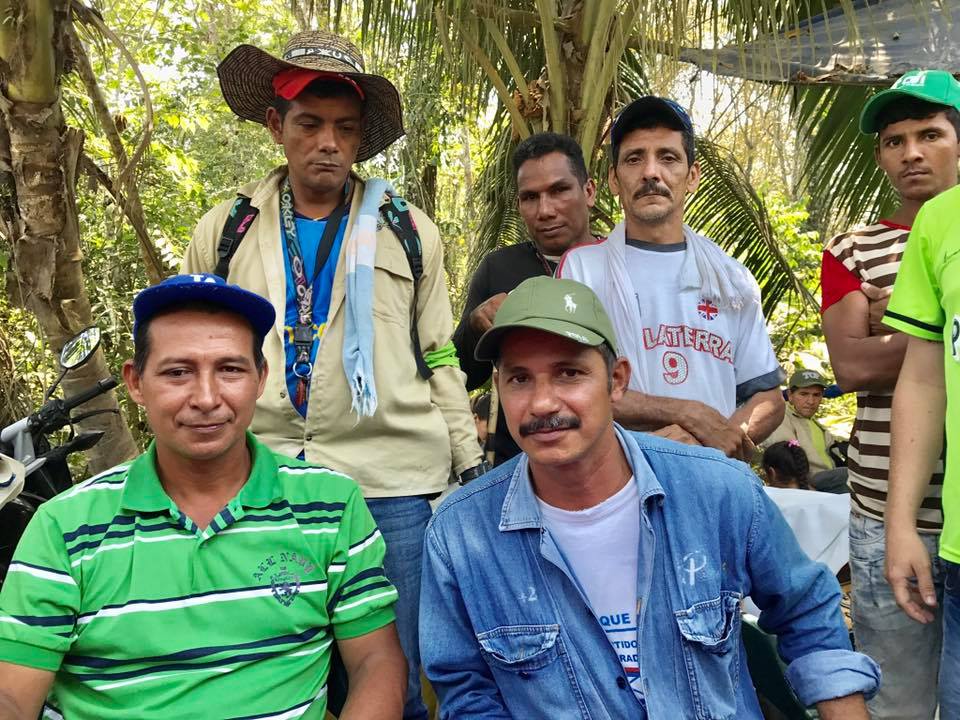
Mar 1, 2019
Some 750 palm workers at Colombia’s largest plantation yesterday signed a landmark agreement with their employer, Indupalma, culminating a years-long effort in which many workers risked their lives to achieve decent wages and safe working conditions. The workers formed a union and fought to force the company to sign a formalization accord and negotiate a collective bargaining agreement.
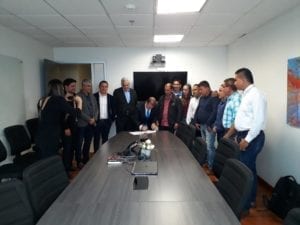
Jorge Castillo, SINTRAINAGRO president, Indupalma management and Colombia’s vice minister of labor sign a landmark contract with far-reaching rights for palm workers. Credit: SINTRAINAGRO
The subcontracted workers—who labor for below-poverty wages and are not covered by the country’s labor laws—will now become permanent employees, with health coverage and union representation. They will no longer be required to pay for their own tools, oxen and other animal care or transport—expenses that often left them in debt to their employer. The contract doubles or triples their wages, provides compensation for work-related injury and illness and establishes safety and health measures.
In January 2018, the palm workers walked off the Indupalma plantation in San Alberto demanding the employer formalize their jobs, with a vast majority casting their ballots for a strike despite their status as subcontracted or “cooperative workers,” which prohibits collective action.
Palm Workers Risked Their Lives in Decades-Long Struggle for Rights
In the early 2000s, companies converted permanently employed palm workers to “cooperative’ status, requiring them to join and pay dues to phony cooperatives—structures that enable companies to evade legal responsibilities under the labor law. Eventually, only 600 palm workers out of 6,000 in the palm producing region in the center of the country were permanent employees, and workers say when they protested their brutal working conditions, they often were threatened or physically attacked by paramilitary forces.
The strike and subsequent agreement at Indupalma caps efforts by palm workers to achieve rights on the job at plantations across Colombia, a struggle that often met brutal retaliation: Up to 130 union activists were assassinated and members of five union executive committees were forced to flee for their lives five times in the past 25 years.
Joining together in a “Pacto Obrero” (coalition of workers), workers throughout Colombia’s palm sector have organized plantation by plantation since 2013, winning contracts that ensure direct hiring and living wages. With support from palm workers at other plantations, the Indupalma strike became so large that the vice minister of labor helped negotiate a preliminary pact in mid-2018.
Palm Workers Made Gains with Global Support
Throughout, palm workers received support from Colombia’s Central Union of Workers (CUT), the AFL-CIO and Solidarity Center, along with a regional labor rights center (CAL); the National Agroindustrial Union, SINTRAINAGRO; and the Corporation for Justice and Freedom (CJL).
Solidarity Center’s engagement with palm workers is part of its larger program in Colombia that supports worksite and industry-wide organizing, intensive education on labor rights under the legal framework that came out of the Labor Action Plan, and legal support for worker demands for access to justice. The Solidarity Center also helped workers develop connections with local, national and political leaders, including members of the U.S. Congress, with whom their meetings provided important political support for ending violence against palm worker activists.
The AFL-CIO and five Colombian labor organizations raised the issue of abusive subcontracting in a May 2016 trade submission under the U.S.-Colombia Trade Promotion Agreement (CTPA) and the U.S. Department of Labor twice reviewed Colombia’s progress in addressing the worker rights violations highlighted in the 2016 U.S. trade submission. In January 2018, the Labor Department’s second review urged the government to “take additional effective measures to combat abusive subcontracting and collective pacts, including improving application of existing laws and adopting and implementing new legal instruments where necessary.”

Feb 26, 2019
Hours after state security agents forcibly removed and detained ITUC-Africa Secretary General Kwasi Adu Amankwah in Harare, Zimbabwe, Amankwah was released and allowed to continue his official visit, according to the Zimbabwe Congress of Trade Unions (ZCTU).
State security agents took Amankwah to Robert Mugabe International Airport in the early morning hours today where he was held for nearly 12 hours without access to a lawyer. Global condemnation over the action and the intervention of ZCTU legal team resulted in his release, says ZCTU. Union leaders confirm he was not injured while in detention, but say he was never given a reason for his detention.
Amankwah was set to meet with ZCTU leaders and representatives of the International Labor Organization (ILO) and employer groups and had just arrived at his hotel when state security showed up. Other ITUC representatives from Brussels who sought to travel to Zimbabwe with Amankwah were denied visas.
Among those condemning Amankwah’s detention are the three largest trade unions in Africa: the Central Organization of Trade Unions-Kenya (COTU-Kenya), the Congress of South African Trade Unions (COSATU) and the Nigerian Labor Congress.
The regionwide union organization, the Southern Africa Trade Union Coordination Council (SATUCC), also condemned the action and strongly urged the government “to stop interfering in trade union work and criminalizing trade union activities and actions.”
Amankwah’s detention follows protests by thousands of Zimbabweans over a 150 percent fuel price hike and the arrest and release of ZCTU Secretary General Japhet Moyo, President Peter Mutasa and dozens of others who now are restricted from travel and must check in with police.
In a statement, ZCTU calls on the government to “prioritize dialogue instead of resorting to cowardly intimidatory tactics where it feels there are discrepancies.”
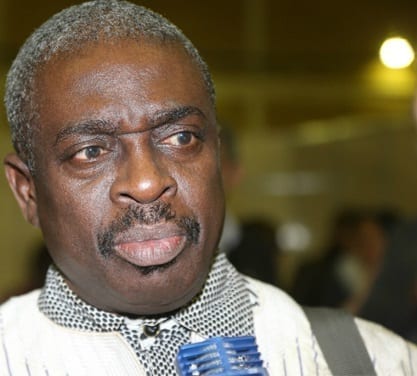
Feb 26, 2019
Kwasi Adu Amankwah, general secretary of the African Regional Organization of the International Trade Union Confederation (ITUC-Africa), was forcibly taken from his hotel at 2 a.m. today in Harare, Zimbabwe, where he had just arrived.
Amankwah was set to meet with leaders of the Zimbabwe Trade Union Confederation (ZCTU) when state security agents took him to Robert Mugabe International Airport, where he has been held for hours.
Officials refused to allow a lawyer from ZCTU to see Amankwah at the airport, according to ZCTU.
“It’s a sad development,” ZCTU President Peter Mutasa told the media. “We are in trouble as human rights defenders and trade unionists.”
Other ITUC representatives from Brussels who sought to travel to Zimbabwe with Amankwah were denied visas.
In addition to the solidarity visit to ZCTU, Amankwah was scheduled to meet with the Zimbabwe Ministry of Labor and representatives of the International Labor Organization (ILO) and employers’ federation. Amankwah has not been charged nor informed of the reason for his detention, according to ZCTU.
“It is not clear why such a senior trade union leader was detained at his hotel in the early morning hours and whisked away to the airport without his belongings—and even denied food brought to him by his lawyer and trade union colleagues as he was detained at the airport,” says Solidarity Center Africa Region Director Hanad Mohamud. “This after lawfully entering Zimbabwe. Why is Kwasi being targeted like this?”
In January, after tens of thousands of Zimbabweans protested a 150 percent fuel price hike, ZCTU Secretary General Japhet Moyo and Mutasa were arrested on charges of subversion and beaten in detention. They since have been released but are restricted from travel and must check in with police.
The January crackdown on worker rights’ activists follows the arrest and release of Moyo, Mutasa and 33 other union leaders in October, as government officials attempted to end a nationwide protest against a financial tax increase and rising prices. Some union activists were beaten, ZCTU Harare offices were cordoned off by more than 100 police, and ZCTU leaders not already in jail were forced into hiding.
In a letter to Zimbabwe President Emmerson Mnangagwa, ITUC-Africa asks for Amankwah’s release and “an unreserved apology for this action” from the Zimbabwe Department of Immigration.
The Congress of South African Trade Unions (COSATU) is among unions around the world decrying Amankwah’s detention and likely deportation, condemning the move “in the strongest terms” and demanding his immediate release and freedom to meet with ZCTU and others.
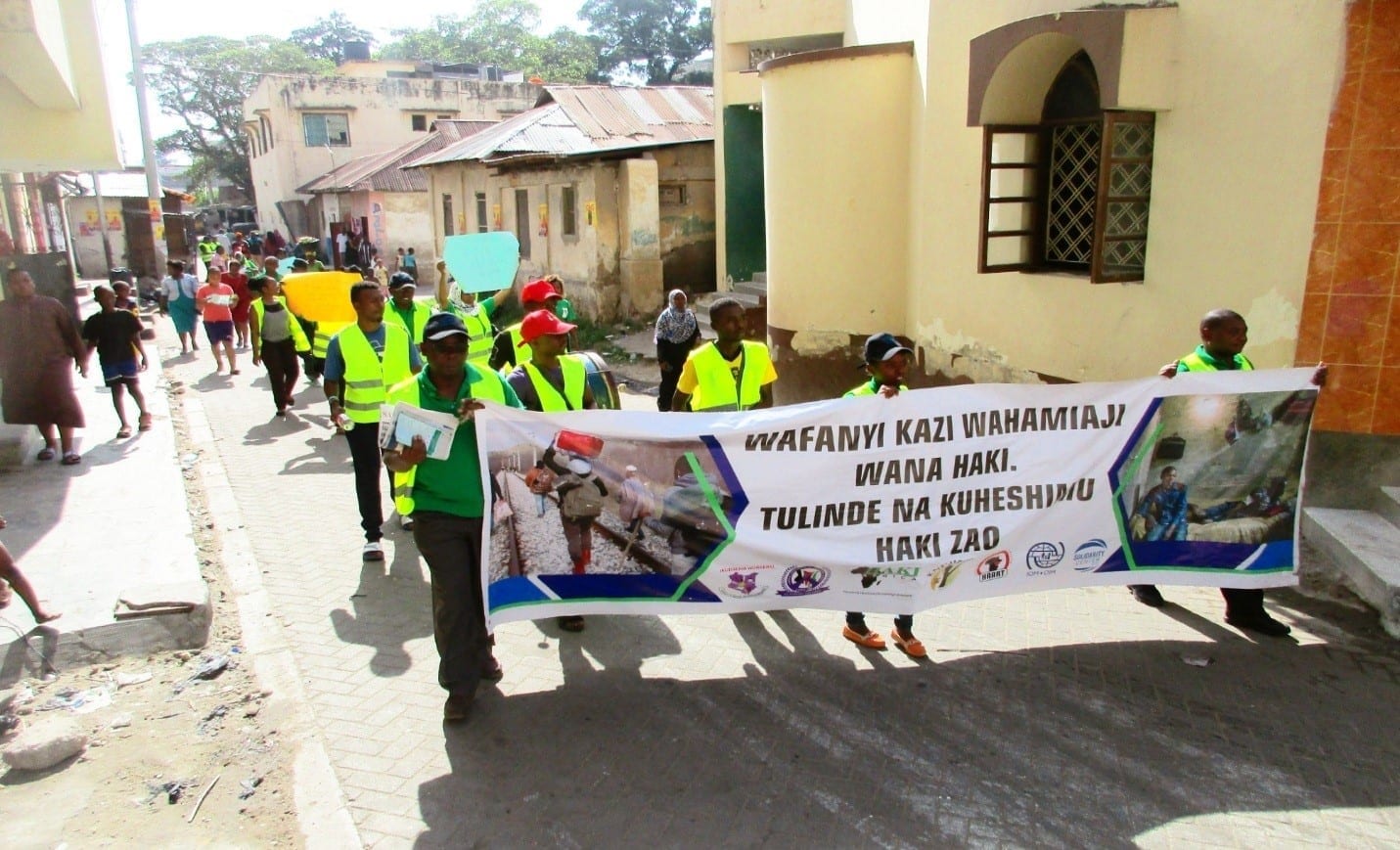
Feb 21, 2019
The Central Organization of Trade Unions-Kenya (COTU-K) and the Kuwait Trade Union Federation (KTUF) signed a cooperative agreement last week in Kuwait City, formalizing the federations’ effort to jointly address issues affecting workers who migrate from Kenya to Kuwait for employment.
“It is crucial to bring together unions from countries on both ends of the migration spectrum to promote a deeper understanding of the challenges workers face along their journey and into the workplace,” said Solidarity Center Director of Middle East and North Africa Programs Hind Cherrouk. “This agreement, which affirms the rights of migrant workers from Kenya in Kuwait, is an important step forward in that regard.”
Millions of migrant workers are trapped in conditions of forced labor and human trafficking around the world, in part as a result of being lied to by labor brokers about the wages and working conditions they should expect. Of the estimated 150 million migrant workers globally, some 67 million labor as domestic workers—83 percent of whom are women—often in isolation and at risk of exploitation and abuse.
The majority of some 34 million Africans are migrants move across borders in search of decent work—jobs that pay a living wage, offer safe working conditions and fair treatment. Often they find employers who seek to exploit them—refusing to pay their wages, forcing them to work long hours for little or no pay, and even physically abusing them. Kenyan women signing on for domestic work in Saudi Arabia, for example, were told they would receive 23,000 Kenya shillings ($221) a month, only to find upon their arrival that the pay was significantly less and the working and living conditions inhumane. Through the Kenya Union of Domestic, Hotel, Educational Institutions, Hospitals and Allied Workers (KUDHEIHA), COTU-K is supporting a multi-year effort to protect domestic workers migrating from the coastal area surrounding the city of Mombasa to homes in the Middle East.
Unions around the globe are increasingly taking joint action to create community and workplace-based safe migration and counter-trafficking strategies that emphasize prevention, protection and the rule of law. KTUF spearheaded a groundbreaking 2015 domestic worker law that granted enforceable legal rights to 660,000 mostly migrant workers from Asia and Africa working in Kuwait as domestic workers, nannies, cooks and drivers, and urged further protection for migrant workers in Kuwait and other Gulf countries. That same year, unions in Asia and the Gulf signed a landmark memorandum of understanding (MOU) that promoted and outlined steps for coordination among unions in organizing and supporting migrant workers in those regions. The Solidarity Center and its partners in the Americas in 2017 crafted a worker rights agenda for inclusion in the United Nations Global Compact on Safe, Regular and Orderly Migration.
“There is a potentially powerful role for union-to-union, cross-national and, in this case, cross-regional solidarity in protecting the dignity of migrant workers traveling from Africa to the Middle East. The Solidarity Center is proud to be a partner in this process and trade union-centered approach between the trade union movements of Kuwait and Kenya,” said Solidarity Center Director of Africa Programs, Hanad Mohamud.






